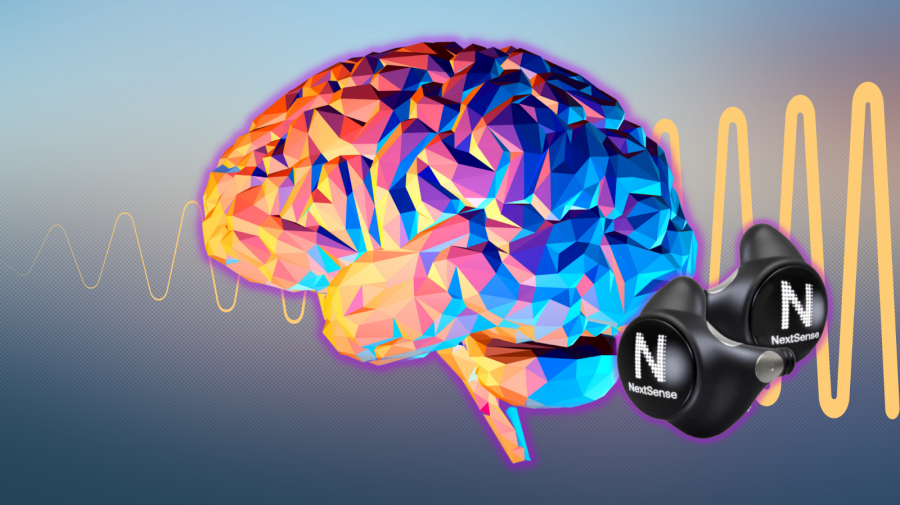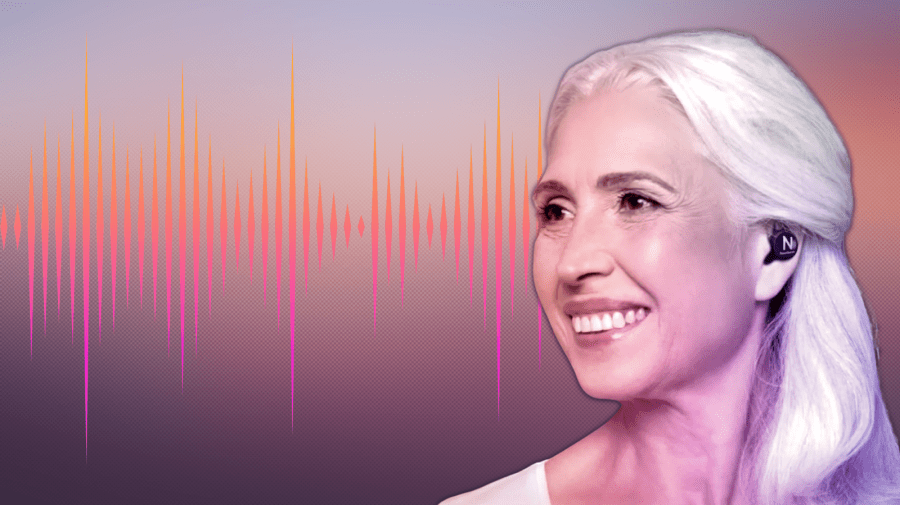
A tech startup is looking to bend — or take up residence in — your ear, all in the name of science. NextSense, a company born of Google’s X, is designing earbuds that could make heading into a healthcare facility for an EEG or polysomnogram a thing of the past. Instead, a simple set of earbuds collect all of the necessary data, creating a convenient (and stylish) way to monitor brain health.
But Is NextSense really onto something, or is the company heading in the same direction as Theranos?
NextSense: What It Is, What It’s Doing, and Where It Stands Today
What Are the NextSense Earbuds Designed to Do?
In the simplest sense, the NextSense earbuds are potential substitutes for the bulky equipment generally required for certain brain-health checks, like EEGs and polysomnograms. Those technologies are often necessary for the diagnosis, treatment and monitoring of conditions like epilepsy, but they are far from comfortable or convenient.
“Traditional brain health monitoring technology like EEG machines and polysomnograms are too bulky for home use, requiring patients to stay overnight at hospitals or sleep study clinics for observation,” NextSense said in a press release. “The high cost of care and lack of comfort of these devices makes long-term and continuous monitoring nearly impossible. Not only are these data based on a single timeframe, [but] they observe what is anything but an ordinary night’s sleep. And for anyone living with epilepsy, the unpredictability of seizures makes direct observation and high-quality data-gathering exceedingly rare.”
But how would the devices work? Convenient and portable, the NextSense earbuds would collect longitudinal EEG data. While the final design of the earbuds may vary from the company’s current iteration, they likely won’t be too much different than the audio-focused devices you see on the market today. (Think AirPods that have the ability to monitor your health.)
Since that’s the case, the biosensing earbuds allow for easier data collection without the disruption that comes with many traditional approaches. Additionally, by “combining that data with environmental and behavioral patterns collected from smart devices and timely analysis,” NextSense claims doctors could “identify triggers, diagnose certain conditions and tailor treatment and medication recommendations in real-time.”
The Potential Benefits of the Tech
The NextSense earbuds could, theoretically, revolutionize the detection, management, and treatment of certain seizure disorders. It allows for thorough data collection while a patient lives their normal life, providing opportunities for in-depth analysis without the hindrances created by abnormal situations, such as sleep studies in labs. In short, the devices would cut down on variables.

Real-time monitoring could also alert individuals that experience seizures of upcoming episodes before they occur. That creates opportunities to improve patient safety, allowing them to take action to reduce injury risks associated with seizures, or request assistance beforehand should they need to do so.
While patients who experience seizures are the company’s current target demographic, it’s possible the earbuds could allow for brain-activity studies focused on other conditions. Precisely what that would look like isn’t clear — though any condition with a brain activity-related characteristic could be of interest to the experts behind NextSense.
Current Status of NextSense’s Earbuds
In the world of medical devices, testing is typically a lengthy, multi-phased process. Along with ensuring efficacy, safety is a big part of the equation. Since that’s the case, new healthcare treatments usually don’t reach the market very quickly, barring pandemic-level emergencies.
While the NextSense earbuds have undergone their fair share of testing, that journey isn’t complete. Emory University is preparing to conduct a “Sleep/Wake State Assessment With Non-invasive Earbuds” that’s related to the device. There’s also an “Earbud EEG Feasibility Study” that’s in its early stages. While the first study has an estimated completion date of December 2022, the second isn’t expected to be complete until August 2024, which gives us some indication of the development timeline.
There could be more testing beyond those studies, too. As a result, NextSense’s exact timeline — or potential launch date — isn’t clear.
Is NextSense the Next Theranos?
In many ways, the NextSense earbuds appear to be technological marvels — so astounding that experts have voiced doubts about their alleged effectiveness. “One of the worst sensors in the world is an EEG sensor,” said X senior lead John Stivoric in an interview with Wired. “There’s environmental noise, surface noise, motion of the body, and so forth. I thought, OK, [the earbuds] shouldn’t work. But [they] do work. These signals are showing up. How is this even possible?”
Even if Stivoric came around to the realization that the earbuds work, that sort of “how is this possible?” sentiment, understandably, often leaves people skeptical. As a result, some would-be buyers may be wondering if NextSense is the next Theranos — a company and idea that’ll go from miraculous to fraudulent with shocking speed.
Elizabeth Holmes, the founder of Theranos, still holds the distinction of being the youngest woman to become a self-made billionaire. The Stanford dropout claimed her company had successfully developed a blood-monitoring device that could revolutionize medicine, detecting a range of conditions with a simple finger prick — with a single drop of blood. Ultimately, those claims were false.

Holmes and Ramesh Balwani, the chief operating officer at Theranos, ultimately faced charges relating to misleading investors, regulators and the public about the technology’s effectiveness. Rather quickly, the company fell apart. Instead of launching Theranos devices in Walgreens’ stores across the country, Holmes and Balwani found themselves in deep legal trouble.
Since then, Theranos stands as a prime example of something that was too good to be true. Needless to say, being skeptical of medical devices that seem like miracle solutions is an understandable position to maintain. However, while a healthy dose of skepticism is okay, Theranos’ failure doesn’t mean NextSense is heading down that road.
It’s still early on in the earbuds’ clinical testing journey, but NextSense, unlike Theranos, boasts some serious research clout, thanks, in part, to the organizations and institutions that are conducting those trials. And while NextSense likely won’t be defrauding the public or healthcare industry, only time will tell if the device is as effective as it promises.






